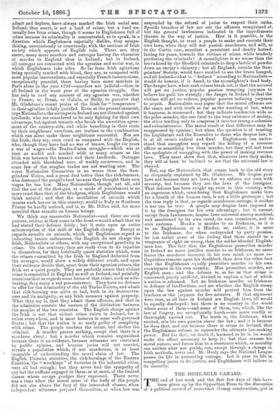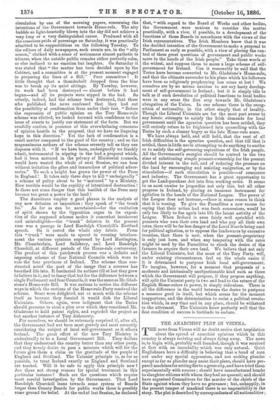THE HOME-RULE CANARD.
THE end of last week and the first few days of this have been given up by the Opposition Press to the discussion of a political canard of somewhat clumsy construction, put in
circulation by one of the morning papers, concerning the intentions of the Government towards Home-rule. The airy -bubble so light-heartedly blown into the sky did not achieve a very long or a very distinguished career. Produced with all the conscious pride of parentage on Saturday, it was practically admitted to be supposititious on the following Tuesday. To -the editors of daily newspapers, such events are, in the "silly season," clothed with a sense of seriousness almost pathetic to witness, when the outside public remains either perfectly calm, or else inclined to no emotion but laughter. On Saturday it -was stated that "the matter has been decided upon by the .Cabinet, and a committee is at the present moment engaged -in preparing the lines of a Bill." Poor committee ! It little thought that a thunderbolt dropped from the blue was to break up its quiet sittings. By Tuesday, however, its work had been destroyed — almost before it had begun—and all its projects were nipped in the bud. So utterly, indeed, had the scheme been destroyed, that those who published the news confessed that they had out the possibility of confirmation from under their feet. "Before the expression of public opinion on the Tory Home-rule scheme was elicited, we looked forward with confidence to the issue of events to justify our statement of the facts. But we candidly confess, in presence of this overwhelming consensus of opinion hostile to the proposal, that we have no lingering hope in this direction." Yet the lack of confirmation is a small matter compared to the good of the country ; and so the magnanimous authors of the scheme serenely tell us they can dispense with it. "If we have been, undesignedly we frankly admit, instrumental in nipping in the bud a proposal which, had it been matured in the privacy of Ministerial counsels, would have wasted the whole of next Session, we can bear without irritation the gibes and innuendoes of political adver- saries." To such a height has grown the power of the Press in England I It takes only three days to kill " undeeignedly " a scheme of policy about to be " matured " by a Ministry.
• How terrible would be the rapidity of intentional destruction Is there not some danger that this basilisk of the Press may become too great a power in the land ?
The Americans employ a good phrase in the analysis of any new delusion or imposition ; they speak of "the trunk lie." As far as can be ascertained—for the exaltation of spirit shown by the Opposition organ in its exposi- tion of the supposed scheme makes it somewhat incoherent and unintelligible—the "trunk" delusion in the present case was a passage in Lord Randolph Churchill's Dartford speech. On it rested the whole airy fabric. From this " trunk " were made to sprout in cunning interlace- ment the various opinions expressed by Lord Hartington, Mr. Chamberlain, Lord Salisbury, and Lord Randolph Churchill, at different periods of the Home-rule controversy. The product of this patchwork process was a definite and imposing scheme of four National Councils which were to rule the four provinces of Ireland. The scheme thus con- structed acted the part of the image that a sorcerer has breathed life into. It fascinated its authors till at last they grew to believe in it, and to fancy that but for the difference between a single Parliament and four Councils, it was the same as Mr. Glad- stone's Home-rule Bill. It was curious to notice the different ways in which the sections of the Home-rule Party received the scheme. Some were delighted, not so much with the scheme itself as because they fancied it would dish the Liberal Unionists. Others, again, were indignant that the Tories should presume to steal a plan over which they considered Mr. Gladstone to hold patent rights, and regarded the project as but another instance of Tory dishonesty.
For ourselves, we should be extremely surprised if, after all, the Government had not been most gravely and most earnestly considering the subject of local self-government as it affects Ireland. The great effort of the new Tory Ministry is undoubtedly to be a Local Government Bill. They declare that they understand the country better than any other party, and they keenly desire to pass a measure which will for the future give them a claim on the gratitude of the people of England and Scotland. The Unionist principle is, as far as possible, to treat Ireland exactly as England and Scotland are treated. Will it be safe to apply this principle now ? Are there not strong reasons for special treatment in this particular instance ? Such are the questions which require most careful investigation by the Government. That Lord Randolph Churchill leans towards some system of Boards larger than County Boards for public works there is possibly some ground for belief. At the end of last Session, he declared'
that, "with regard to the Board of Works and other bodies, the Government were anxious to consider the matter practically, with a view, if possible, to a development of the functions of these Boards in accordance with the views of the Irish representatives. The Irish Members knew that it was the decided intention of the Government to make a proposal to Parliament as early as possible, with a view of placing the con- trol of these great questions of government and public works more in the hands of the Irish people." Take these words at the widest, and suppose them to mean a large scheme of self- government for Ireland. Can it reasonably be said that the Tories have become converted to Mr. Gladstone's Home-rule, and that the ultimate surrender to his plans which his followers have been so religiously prophesying has come at last ? We ourselves are by no means anxious to see any hasty develop- ment of self-government in Ireland ; but it is simply idle to talk as if such devolution of political functions to local bodies were in any sense the first step towards Mr. Gladstone's abrogation of the Union. In one scheme there is the recog- nition of nationality, in the other simply that of locality. Though the Liberal Unionists are for the most part averse to any heroic attempts to satisfy the Irish demands for local government until the agrarian question has been settled, they will entirely refuse to be frightened into quarrelling with the Tories by such a clumsy bogey as the late Home-rule scare. We have always held, and still hold, that the root of all Irish difficulties is the agrarian question, and that till that is settled, there is little use in attempting to do anything to soothe or to satisfy the self-governing aspirations of the Irish people. All the Government's energies should be centred in the two aims of substituting simple peasant-ownership for the present divided interest in the soil, and of reducing the pressure on the land by encouraging and assisting emigration, or by the stimulation—if such stimulation is possible—of commerce and industry. The Government has a great opportunity to get the Land-purchase Act into firm working order. It seems to us most unwise to jeopardise not only this, but all other progress in Ireland, by placing an immense instrument for agitation in the hands of the National League. The power of the League does not increase,—there is some reason to think that it is waning. To give the Parnellites a new excuse for saying that their action had won fresh concessions, would be only too likely to fan again into life the latent activity of the League. When Ireland is once fairly well sprinkled with peasants who own their own land and who pay all their own rates, there will be far less danger of the Local Boards being used for political agitation, or to oppress the landowners by excessive taxation, than there is now, when the peasant-proprietary is only just born, and when any tampering with the rates might be used by the Parnellites to check the desire of the farmers to acquire their own land. We believe that not only the Liberal Unionists, but the mass of the Tory Party, will, under existing circumstances, feel on the whole easier if it is determined to postpone Irish local self-government. To imagine, however, for a moment that proposals of a moderate and intrinsically unobjectionable kind such as those which the Government will propose, if they propose anything, will split the Unionist party in two and lead to the return of the English Home-rulers to power, is simply ridiculous. There is all the difference in the world between the desire to postpone a measure good in itself, but which seems for the moment inopportune, and the determination to resist a political revolu- tion which, in any time and in any place, should be withstood to the uttermost. The Unionists know perfectly well that the first condition of success is fortitude to endure.



































 Previous page
Previous page